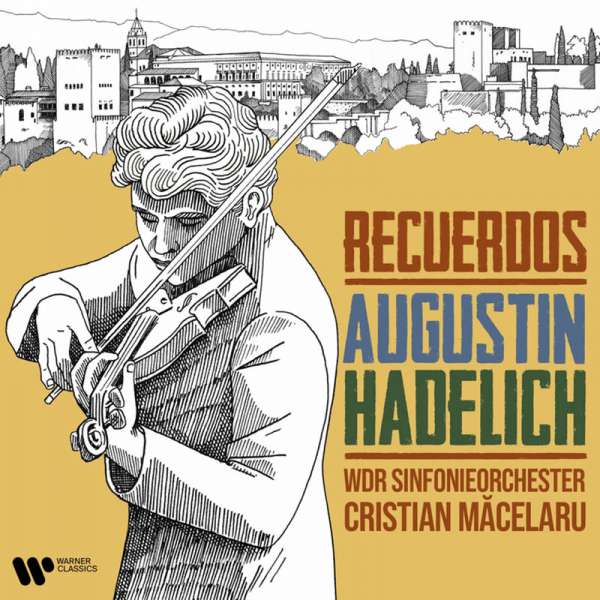Augustin Hadelich beginnt seine CD mit der Carmen Fantasie von Sarasate, und man glaube ja nicht, dass er sie vordergründig brillant musiziert, wie das vor ihm viele andere Geiger getan haben. Nein, er erfindet das Werk quasi neu. Er hat sich viele Gedanken über Phrasierung und Verzierung, über Farben und Dynamik gemacht, und was dabei herausgekommen ist, ist total überraschend, technisch, aber auch rhetorisch oder besser ‘darstellerisch’.
Nicht weniger reizvoll ist das 2. Prokofiev-Konzert, das vom Geiger sowohl großes technisches Können als auch Kantabilität verlangt. Hadelich, Macelaru und dem WDR-Orchester gelingt eine enorme wirkungsvolle Einspielung. Es gibt nicht viele Interpretationen, die die bizarren Tanzrhythmen und die lyrischen Partien dieses Konzerts so spannend und vor allem überzeugend homogen wiedergeben und diesem Opus 63 dadurch eine derart geschlossene, zusammenhängende Form geben.
In seinem immer noch zu wenig bekannten Violinkonzert äußerte sich der Pazifist Benjamin Britten 1939 musikalisch zum spanischen Bürgerkrieg und zum Nazi-Überfall auf Polen. In unserer Zeit erlangt es eine zusätzliche, weltgeschichtliche beeinflusste Dimension.
Die in allen Hinsichten überragende Darstellung des Werks durch Augustin Hadelich und Christian Macelaru gibt dem Werk so viele Farben, Kontraste und eine derartige Intensität, dass es sich dem Hörer unmittelbarer offenbart als in anderen Aufnahmen, wo nicht viel mehr zu spüren ist als Technik und Virtuosität. Hier kommt wirkliche Musik zustande, Musik, die verstörend wirkt und in der bedrohlichen Zeit von 1939 wie auch in der unsrigen ein düsteres Tableau der Weltsituation zeichnet. Macelaru und das WDR-Symphonieorchester nehmen aktiv an diesem Britten-Ereignis teil und zeigen, dass eine optimale Kommunikation zwischen Solist und Orchester ihre Früchte trägt. Es ist unmöglich, von diesem suggestiven Musizieren nicht gefesselt zu werden, zu aufregend und oft atemberaubend bedrohlich ist der musikalische Diskurs!
Ein Solostück beschließt das Programm: Francisco Tarregas Recuerdos de la Alhambra für Gitarre in der Bearbeitung für Violine von Ruggero Ricci. Hadelich sagt: « Nach Britten fühlt sich Recuerdos de la Alhambra an wie eine schmerzliche Meditation über Verlust. » Ditto!
Augustin Hadelich begins his CD with Sarasate’s Carmen Fantasy, and don’t think that his performance is superficially brilliant, as many other violinists have done before him. No, he virtually reinvents the work. He has given a lot of thought to phrasing, ornamentation, colors and dynamics, and the result is totally surprising, technically, but also rhetorically.
No less delightful is Prokofiev’s 2nd Violin Concerto, which demands both great technical skill and cantabile from the violinist. Hadelich, Macelaru and the WDR Orchestra have made an enormously effective recording. There are not many interpretations that render the bizarre dance rhythms and the lyrical parts of this concerto in such an exciting and, above all, convincingly homogeneous way, thereby giving this Opus 63 such a coherent form.
In his violin concerto, still too little known, the pacifist Benjamin Britten expressed himself musically in 1939 on the Spanish Civil War and the Nazi invasion of Poland. In our time it acquires an additional dimension influenced by world history.
The performance of the work by Augustin Hadelich and Christian Macelaru, outstanding in all respects, gives the work so many colors, contrasts and such intensity that it reveals itself to the listener more immediately than in other recordings, where not much more is felt than technique and virtuosity. Real music is created here, music that has a disturbing effect and paints a gloomy tableau of the world situation in the threatening time of 1939 as well as in our own. Macelaru and the WDR Symphony Orchestra take an active part in this Britten event and show that optimal communication between soloist and orchestra bears its fruits. It is impossible not to be captivated by this evocative music-making, the musical discourse is too exciting and often breathtakingly threatening!
A solo piece concludes the program: Francisco Tarrega’s Recuerdos de la Alhambra for guitar in Ruggero Ricci’s arrangement for violin. Hadelich says, « After Britten, Recuerdos de la Alhambra feels like a painful meditation on loss. » Ditto!




















